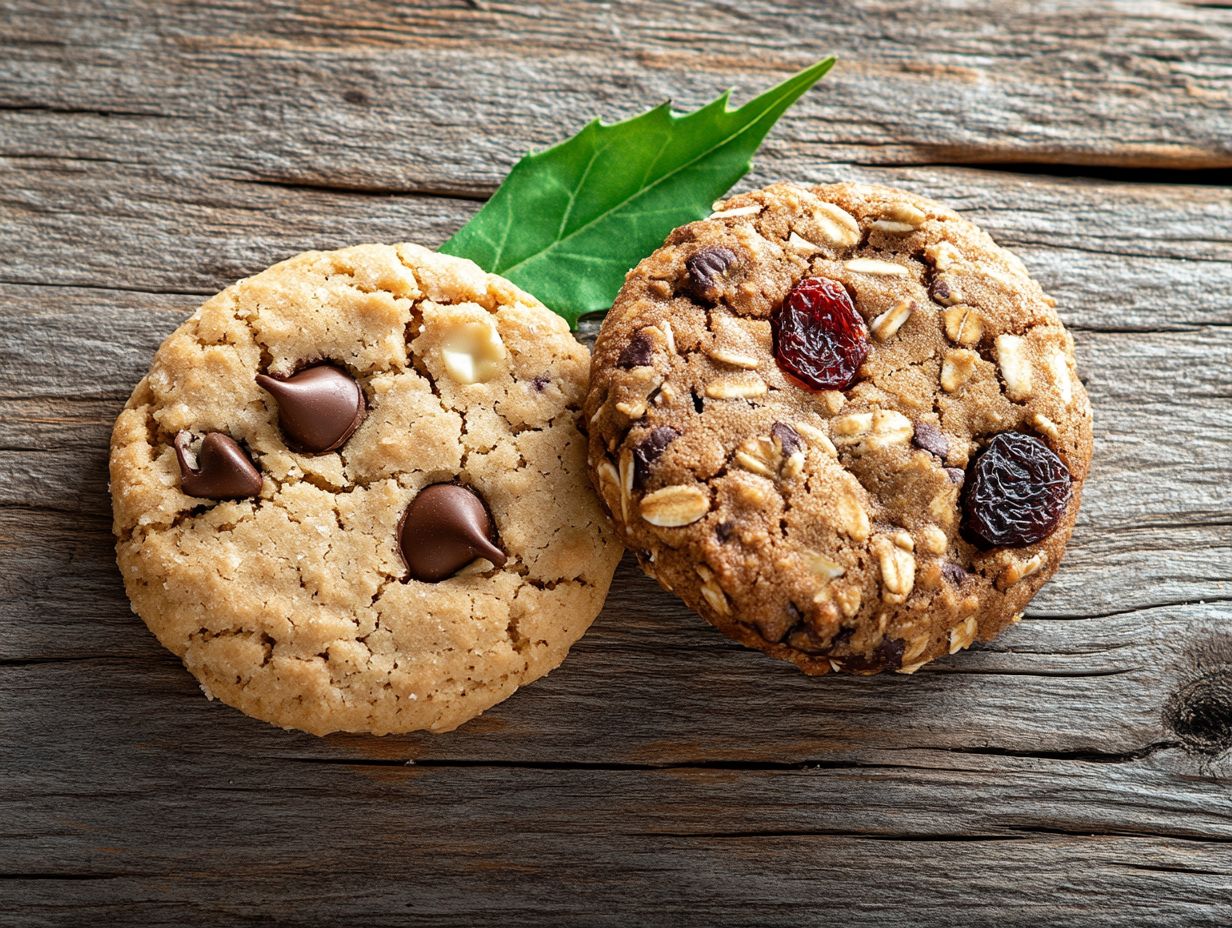Vegan vs. Plant-Based Cookies: What’s the Difference?
In the realm of sweets, cookies undoubtedly hold a position of prominence. However, the discussion surrounding vegan versus plant-based options has captured the attention of health-conscious and environmentally-minded snack enthusiasts alike. This debate is especially relevant within the realms of vegan and plant-based diets, which have seen increasing popularity.
Are vegan cookies genuinely a healthier choice? How do they compare to their plant-based counterparts? Are they truly healthier cookies that align with a health-conscious lifestyle?
This article delves into the ingredients that differentiate these two categories. It assesses their health benefits and examines the environmental implications of your cookie choices. Additionally, it offers some delectable dessert recipes that you can try at home.
After reading this, you’ll be excited to choose cookies that fit your lifestyle!
Contents
- Key Takeaways:
- What Are Vegan Cookies?
- Are Vegan Cookies Healthier Than Regular Cookies?
- What Are Plant-Based Cookies?
- What Are the Ingredients Used in Plant-Based Cookies?
- Are Plant-Based Cookies Healthier Than Vegan Cookies?
- What Is the Difference Between Vegan and Plant-Based Cookies?
- 1. Ingredients
- Which Type of Cookie Should You Choose?
- 1. Personal Preferences
- 2. Dietary Restrictions
- Frequently Asked Questions
- What is the main difference between vegan and plant-based cookies?
- Are vegan cookies healthier than plant-based cookies?
- Can vegan and plant-based cookies be considered allergy-friendly?
- Are vegan and plant-based cookies suitable for people with gluten intolerance and other dietary restrictions?
- Do vegan and plant-based cookies taste different from traditional cookies, and what are their health benefits?
- Can I find vegan and plant-based cookies at the supermarket, and what should I look for?
Key Takeaways:

- Vegan cookies are made without any animal products, using ingredients such as nut milk and flaxseed as substitutes for dairy and eggs. These healthy cookies often feature plant-based ingredients like almond butter and coconut milk.
- Plant-based cookies are made with whole, plant-based ingredients and are often free of refined sugars and flours. They incorporate elements like fresh fruits and vegetables to boost their health benefits.
- The main differences between vegan and plant-based cookies lie in their ingredients and potential health benefits. Both options have a positive impact on the environment and can contribute to a well-balanced diet, often recommended by nutritionists.
What Are Vegan Cookies?
Vegan cookies present a delightful alternative to traditional cookies. They are expertly crafted without any animal products, making them a perfect choice for those embracing a vegan lifestyle or anyone in search of healthier baked treats.
These cookies showcase a variety of plant-based ingredients, such as almond butter and oat flour. They are often sweetened with natural options like maple syrup and coconut sugar, elevating their flavor profile and providing a range of health benefits.
Rich in nutrients and flavor, vegan cookies seamlessly integrate into a balanced meal plan. This allows you to indulge guilt-free while satisfying your sweet cravings. Nutritionists often highlight these cookies for their high fiber content and plant-based protein.
What Are the Ingredients Used in Vegan Cookies?
Vegan cookies are crafted from an array of plant-based ingredients that elegantly replace traditional components. This presents a delightful and healthier alternative for dessert enthusiasts. You’ll find common ingredients like almond butter, oat flour, and coconut milk, all of which contribute to the cookies’ wonderfully chewy texture and rich flavor.
Instead of processed sugars, natural sweeteners such as maple syrup or coconut sugar are often employed. This makes these cookies an excellent choice for those with dietary restrictions or those simply seeking a guilt-free indulgence. Natural sweeteners contribute to the cookies’ lower calorie content and higher health benefits.
These carefully selected ingredients not only elevate the flavor profile but also enhance the nutritional benefits. This makes them appealing to health-conscious consumers like you. Take almond butter, for example; it’s loaded with healthy fats and proteins, promoting a sense of fullness while delivering essential nutrients like vitamin E and magnesium.
Oat flour serves as a fantastic source of dietary fiber. It aids digestion and helps to sustain your energy levels throughout the day. Coconut milk lends its creamy texture and depth while providing beneficial medium-chain fatty acids that can support your metabolic health.
These ingredients provide excellent sources of calcium, enhancing your overall diet. By choosing these wholesome ingredients, you can create a dessert that balances indulgence and nourishment. This proves that vegan cookies can satisfy your cravings without sacrificing nutritional value.
Moreover, these ingredients are often highlighted in cookie recipes shared by renowned nutritionists like Keri Gans and Christine Kirlew. What s your favorite type of cookie? Let’s find out if it’s vegan or plant-based!
Finally, consider trying your hand at making your own cookies! Share your experiences and favorite recipes with friends.
Are Vegan Cookies Healthier Than Regular Cookies?
When comparing vegan cookies to regular cookies, you might wonder if the former truly offers a healthier choice. Vegan cookies often pack in more whole grains, natural sweeteners, and healthy fats while avoiding processed ingredients and animal products. This results in cookies that are lower in calories and richer in essential nutrients like fiber and plant-based protein. These attributes align seamlessly with dietary guidelines recommended by health organizations such as the American Heart Association. The vegan movement has significantly influenced the creation of these homemade cookies, making them a staple in many households.
Research suggests that vegan cookies may have significantly higher fiber content, with some varieties containing up to 5 grams per serving, compared to less than 1 gram typically found in traditional cookies. A study published in the Journal of Nutrition highlights that diets rich in plant-based foods could lower the risk of chronic diseases, emphasizing the potential health benefits of opting for vegan options.
These cookies often feature ingredients like nuts and seeds, enhancing flavor while providing beneficial healthy fats and protein, making them a more satisfying treat. Choosing vegan cookies also addresses ethical concerns related to animal welfare and environmental impact. This makes them an appealing choice for those pursuing a more compassionate and sustainable lifestyle. For instance, healthier cookie recipes often include plant-based flavors to satisfy both ethical and health-conscious consumers.
What Are Plant-Based Cookies?
Plant-based cookies embody a refined category of baked goods designed for those who embrace a plant-based lifestyle. They focus on whole grains, fruits, and legumes. Unlike conventional cookies packed with processed sugars and unhealthy fats, these cookies harness the power of wholesome ingredients like almond milk and coconut oil. They achieve delightful sweetness through natural sweeteners. Foods like these are often recommended for improving vegetable intake and overall health.
This exceptional variety not only satisfies your dessert cravings but also aligns with the increasing demand for healthier and ethically sourced food options.
What Are the Ingredients Used in Plant-Based Cookies?

The ingredients that compose plant-based cookies are diverse, highlighting wholesome, nutritious elements that elevate both flavor and health benefits. You ll often find whole grains like oat flour, natural sweeteners such as maple syrup, and plant-based proteins sourced from nuts and legumes. These ingredients produce delightful cookies while enhancing fiber content and providing essential nutrients, making them an ideal choice for healthier dessert options.
Incorporating almond butter or coconut oil adds a luxurious richness and delivers healthy fats that foster a sense of fullness. Including chia seeds or flaxseeds enhances the omega-3 fatty acid content, which is beneficial for your heart, further enriching the cookie’s nutritional profile. This thoughtful selection of ingredients decreases overall caloric density without compromising taste, allowing you to indulge in cookies that are lower in calories yet fully satisfy your sweet tooth.
By focusing on nutrient-dense components, these plant-based treats artfully combine satisfying flavors with advantageous health properties, making them a superb choice for those who eat mindfully. They also meet the growing demand for healthier, ethically sourced food options.
Get ready to indulge in the delicious world of plant-based cookies! Explore more recipes and try making your own delightful treats!
Are Plant-Based Cookies Healthier Than Vegan Cookies?
The health comparison between plant-based cookies and vegan cookies is fascinating! Both options strive to offer healthier alternatives to traditional baked goods.
Plant-based cookies often feature nutrient-dense ingredients like legumes and fresh fruits, which can elevate their nutritional quality. Vegan cookies, however, might sometimes rely on processed ingredients that can undermine their health benefits.
It’s crucial to examine the ingredient list and caloric density of each type to find the one that best aligns with your health goals.
By selecting cookies crafted from whole, unprocessed ingredients, you can savor delicious flavors while enjoying health benefits like improved digestion and heightened energy levels. If you have specific dietary restrictions, understanding the differences can guide you toward more mindful eating choices that resonate with your personal health philosophy.
The fiber, vitamins, and antioxidants in plant-based cookies can significantly enhance your overall well-being.
As someone aiming for a balanced diet, look beyond the vegan label. Delve into the nutritional content of each cookie, assessing how every ingredient contributes to your health-conscious lifestyle. For those on a weight loss journey, understanding the calorie content and overall nutritional value is crucial.
What Is the Difference Between Vegan and Plant-Based Cookies?
While vegan and plant-based cookies are often treated as if they mean the same thing, understanding the subtle distinctions is essential for anyone seeking healthier dessert options. Consulting with a primary care provider or a nutritionist can provide personalized advice on which type of cookie fits your dietary needs.
Vegan cookies are made exclusively without any animal products, adhering closely to a vegan lifestyle. In contrast, plant-based cookies focus more on plant-derived ingredients, even if they include some animal products.
This distinction can significantly influence your choices, particularly regarding health benefits, ingredient quality, and ethical considerations surrounding your food selections. For instance, choosing cookies with higher fiber and protein can positively contribute to your dietary nutrients and overall health.
1. Ingredients
The ingredients in vegan and plant-based cookies can vary greatly! This variance influences both flavor and health benefits in significant ways.
You might find that vegan cookies often feature almond butter and coconut sugar, while plant-based varieties introduce a broader range of ingredients like legumes or fresh fruits.
This delightful diversity can lead to notable differences in nutritional quality. The choice of ingredients plays a crucial role in determining the cookies’ fiber, protein content, and overall health benefits.
These variations not only impact the cookies’ taste but also their overall nutritional profile. For example, when you opt for cookies that incorporate black beans or chickpeas, you’re treating yourself to a substantial boost of plant-based protein and extra fiber, making them more filling and satisfying.
Cookies made with traditional vegan ingredients may focus on sweetness and texture. However, this could mean sacrificing some nutritional benefits along the way. Incorporating natural sweeteners can help bridge this gap.
Your choices regarding natural sweeteners and healthy fats also influence the cookie’s glycemic index (a measure of how quickly food raises blood sugar levels) and fat composition. This illustrates how your culinary creativity can align with nutritional goals and contribute to making healthier cookies, allowing you to enjoy indulgences while being mindful of health.
2. Health Benefits
Vegan and plant-based cookies both present unique health benefits tailored to various dietary restrictions and preferences. Their specific advantages can vary.
Vegan cookies are appealing because they are free from animal products. This can help mitigate certain health risks often associated with processed foods.
In contrast, plant-based cookies typically offer higher fiber content and greater nutrient density, thanks to ingredients like legumes and whole grains. These ingredients promote overall health and wellness.
Incorporating plant-based foods into your diet can provide a variety of dietary nutrients. Adding these nutritious ingredients can lead to improved digestive health.
They may also assist in weight management by enhancing feelings of fullness. Experts like Keri Gans and Christine Kirlew emphasize that embracing a plant-based or vegan lifestyle can help lower cholesterol levels.
This lifestyle can also reduce the risk of chronic diseases and foster better metabolic health. Whole food plant-based diets are associated with lower incidences of heart disease and diabetes.
Nutritionists champion these benefits in various cookie recipes. According to the American Heart Association, these diets also support calcium sources.
Therefore, when selecting snacks, choosing vegan or plant-based cookies can harmonize with your health aspirations and dietary preferences. Don’t miss out! These cookies are perfect for anyone following a vegan or plant-based diet.
3. Understanding the Environmental Impact of Cookie Choices

The environmental impact of choosing vegan versus plant-based cookies is increasingly relevant in today s health-conscious climate. Ethical concerns about food production are taking center stage.
By opting for vegan cookies, you often help to reduce carbon footprints since they eliminate animal products. On the other hand, plant-based cookies can also support sustainability, especially when they feature local and seasonal ingredients.
As you become more aware of the environmental effects of what you eat, grasping the impact of these cookies becomes essential. The sourcing of ingredients is pivotal in this eco-friendly framework.
By choosing organic and responsibly harvested components, you can minimize harmful agricultural practices and foster biodiversity. If you prioritize ethical food systems, think about the fair treatment of laborers involved in the cookie production process.
Every bite shows that choosing cookies made from conscious ingredients not only impacts your health but also has broader implications for the planet and society. From the baking process to the packaging, these choices resonate profoundly with a growing desire for a more sustainable lifestyle.
Which Type of Cookie Should You Choose?
When selecting between vegan cookies and plant-based cookies, you find yourself in the midst of a delightful decision. This choice is shaped by your personal preferences, dietary restrictions, and health consciousness.
Each type boasts its own unique benefits tailored to diverse taste profiles and nutritional needs. Your choice might also depend on the types of dietary nutrients you prioritize.
If you’re pursuing a diet entirely free of animal products, vegan cookies stand out as an exceptional choice. On the other hand, if you desire a more expansive array of wholesome ingredients, plant-based cookies may be more to your liking.
Both types can be made into healthy cookies if the right ingredients are chosen. By carefully considering these factors, you can navigate your cookie choices toward the most satisfying and healthful options available.
Why not try making your own cookies or explore local options? The choice is yours!
1. Personal Preferences
Your choice between vegan cookies and plant-based cookies is influenced by personal taste. The flavors and textures can vary significantly. If you love rich, creamy flavors, you might prefer vegan cookies made with almond butter or coconut milk. On the other hand, if you’re seeking something unique, try plant-based cookies featuring fresh fruits or legumes. Understanding these flavor profiles can elevate your dessert choices and make your sweet tooth truly satisfied.
You can easily tailor dessert recipes for both types to fit your taste. For instance, if you adore chocolate, a vegan cookie infused with dark cacao will deliver a decadent experience. Alternatively, a plant-based cookie with cocoa nibs and whole grains offers a wholesome yet satisfying bite. If nostalgia strikes, you ll enjoy traditional cookies like a chewy vegan oatmeal raisin or a plant-based peanut butter treat sweetened with maple syrup. Popular options like chocolate chip cookies can also be adapted to fit either diet.
Explore both options to uncover your favorites, ensuring that each sweet craving is fulfilled with the perfect cookie that aligns with your flavor preferences.
2. Dietary Restrictions
When it comes to dietary restrictions, both vegan and plant-based cookies offer enticing options tailored to various needs. You can find gluten-free and nut-free choices. Vegan cookies are ideal for those avoiding animal products, while plant-based cookies focus on natural foods that are minimally processed, making them perfect for specific dietary requirements.
Pay close attention to ingredient lists. This ensures that the cookies align with your health goals and personal preferences. It is especially important for those following a vegan or plant-based diet.
If you need gluten-free options, almond flour or oat flour can create delicious and safe treats, allowing you to avoid traditional wheat-based ingredients. For those with nut allergies, allergen-friendly cookies can use sunflower seed butter or tahini instead of nut-based butters, making them inclusive for everyone.
Transparency in ingredient sourcing is crucial. You deserve to know what goes into your cookies and their origins, as this fosters trust and encourages mindful eating. By prioritizing these considerations, bakers can create delightful treats that are not only enjoyable but also cater to various dietary needs. This approach aligns with nutritionist advice for better health.
Discover delicious options and try making your own cookies! Explore different recipes based on your preferences and dietary restrictions for a fun and tasty baking experience.
3. Environmental Concerns
Environmental concerns are becoming an essential aspect of your food choices, including the decision between vegan and plant-based cookies. By selecting cookies that emphasize sustainable sourcing, you can help mitigate the ecological impact of your food consumption. This choice aligns with ethical concerns and promotes responsible food choices.
Vegan cookies, which avoid animal products, and plant-based cookies, which embrace whole food ingredients, both promote ethical choices in the kitchen while addressing the rising demand for sustainable desserts.
To make informed cookie selections, look for brands that offer organic and fair-trade ingredients. This consideration is vital for those following the vegan movement or a plant-based diet.
This not only supports local farmers but also reduces pesticide usage. Support health organizations that promote sustainable practices to reinforce these efforts.
When choosing cookies, consider those packaged in eco-friendly materials, as this illustrates a commitment to sustainability. This practice aligns with growing customer demand for environmentally responsible products.
Transparency in the sourcing process is vital, so seek out products with certifications that reassure you of ethical practices. This approach is endorsed by several health organizations.
Ultimately, by opting for cookies made from responsibly sourced ingredients and supporting companies that uphold these values, you can enjoy delicious treats while reducing your carbon footprint and encouraging a more responsible food industry. Choosing these cookies not only benefits your health but also supports a sustainable future.
Frequently Asked Questions

The main difference between vegan and plant-based cookies is that vegan cookies are completely free of any animal products, while plant-based cookies may contain some ingredients derived from animals, such as dairy or honey. Vegan cookies often exclude refined sugars, while plant-based cookies may still include them. This distinction is important for those following a strict vegan diet or incorporating more plant-based foods into their meal plan.
While both vegan and plant-based cookies can be made with healthier ingredients, it ultimately depends on the specific recipe and ingredients used. Some vegan cookies may still be high in sugar and fat, while some plant-based cookies could be made with more nutritious whole food ingredients. Consulting nutritionist advice can help you choose the healthiest options.
Both types can cater to specific dietary restrictions and offer allergy-friendly alternatives. Vegan cookies are typically free of common allergens such as dairy and eggs, making them a good option for those with allergies or intolerances, as well as those following a vegan or plant-based diet. However, plant-based cookies may still contain allergens, so it’s important to read the ingredient list carefully and consider healthier cookies, like those made with whole grains or natural sweeteners.
Both vegan and plant-based cookies can be made without gluten-containing ingredients, making them suitable for those with gluten intolerance or celiac disease. However, it’s important to check the ingredient list as some recipes may still include gluten-containing ingredients. Consulting nutritionist advice can also help in making informed food choices.
It depends on the recipe and ingredients used, but vegan and plant-based cookies can have a slightly different taste and texture compared to traditional cookies made with butter and eggs. However, many people enjoy the flavor and texture of vegan and plant-based cookies, especially when using healthy fats like almond butter or coconut milk. Additionally, these cookies can provide health benefits such as higher fiber content and lower calorie content.
Finding Vegan and Plant-Based Cookies
Yes, many brands offer vegan and plant-based cookie options at supermarkets and health food stores.
It’s essential to check the ingredient list to ensure they meet your dietary preferences. Look for cookies made with whole grains, plant-based protein, and fewer processed ingredients for healthy ingredients.
Customer demand for healthier cookies is rising alongside the vegan movement and growing health awareness. Don t miss out on the delicious options available; healthier cookies are becoming a must-have for everyone!






